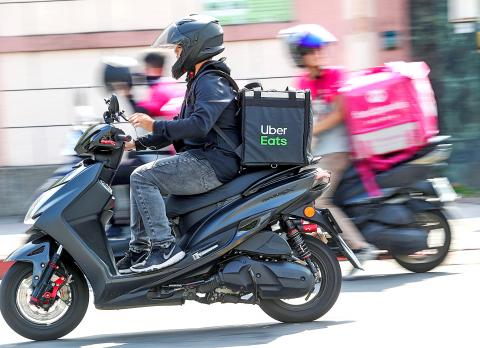The Sharing Economy Association Taiwan (SEAT) yesterday released its proposed code of conduct for food-delivery platform operators, which was signed by four out of five of the platforms.
The working conditions for food-delivery workers are under scrutiny following the deaths of several drivers in traffic accidents.
The National Development Council on Sunday hosted a meeting of representatives of delivery platforms and government agencies to discuss ways of better protecting delivery couriers and ensuring that food orders are not contaminated during delivery.

Photo: CNA
Representatives of the association, which represents UberEats, GoGoVan, Deliveroo, Foodpanda, Lalamove and other providers, agreed that it would start to draft its own code of conduct.
The proposed code of conduct addresses couriers’ safety and the quality of delivered food, and was signed by all but Foodpanda.
“We are glad that food-delivery platform operators — Uber Eats, Deliveroo, GoGoVan and Lalamove — could reach a consensus on the importance of having a code of conduct. We hope this document will serve as the basis of discussions with government officials and the public,” association chairman Andy Peng (彭仕邦) said.
Under the proposed code, food operators agreed that their delivery workers must have valid motor vehicle licenses and agreed to share some of the consumer data they collect with transportation officials and law enforcement agencies to help reduce road safety risks, on condition that it would not invade the privacy of the users and is permissible by law.
Under the code, couriers would be urged not to speed while making deliveries, to ignore their smartphones and pay attention to road conditions.
Platform operators also agreed to suspend or adjust their service based on Central Weather Bureau (CWB) announcements about typhoons or other abnormal weather to protect their delivery workers.
However, the code would not require delivery workers to have labor or health insurance before accepting a delivery.
“All the platform operators are having trouble finding insurance that suits their delivery workers. We will continue to work with the Financial Supervisory Commission and other government agencies, as well as non-profit associations, to develop insurance that works for both platform operators and delivery workers,” Peng said.
Announcement of the proposed code came one day after the Directorate-General of Highways fined Deliveroo and Quickpick NT$500,000 each for failing to complete registration procedures for a transportation business before providing service, and ordered them to shut their operations immediately.
Six delivery platforms earlier this month were fined NT$9,000 each for failing to ensure that their couriers were properly trained in road safety, failing to monitor traffic violations committed by their couriers, and failing to purchase vehicle liability insurance and have their delivery vehicles checked annually by motor vehicle offices.

Several Chinese Nationalist Party (KMT) officials including Chairman Eric Chu (朱立倫) are to be summoned for questioning and then transferred to prosecutors for holding an illegal assembly in Taipei last night, the Taipei Police said today. Chu and two others hosted an illegal assembly and are to be requested to explain their actions, the Taipei City Police Department's Zhongzheng (中正) First Precinct said, referring to a protest held after Huang Lu Chin-ju (黃呂錦茹), KMT Taipei's chapter director, and several other KMT staffers were questioned for alleged signature forgery in recall petitions against Democratic Progressive Party (DPP) legislators. Taipei prosecutors had filed

Taiwan would welcome the return of Honduras as a diplomatic ally if its next president decides to make such a move, Minister of Foreign Affairs Lin Chia-lung (林佳龍) said yesterday. “Of course, we would welcome Honduras if they want to restore diplomatic ties with Taiwan after their elections,” Lin said at a meeting of the legislature’s Foreign Affairs and National Defense Committee, when asked to comment on statements made by two of the three Honduran presidential candidates during the presidential campaign in the Central American country. Taiwan is paying close attention to the region as a whole in the wake of a

President William Lai (賴清德) has appointed former vice president Chen Chien-jen (陳建仁) to attend the late Pope Francis’ funeral at the Vatican City on Saturday on his behalf, the Ministry of Foreign Affairs said today. The Holy See announced Francis’ funeral would take place on Saturday at 10am in St Peter’s Square. The ministry expressed condolences over Francis’ passing and said that Chen would represent Taiwan at the funeral and offer condolences in person. Taiwan and the Vatican have a long-standing and close diplomatic relationship, the ministry said. Both sides agreed to have Chen represent Taiwan at the funeral, given his Catholic identity and

Lawmakers from the Democratic Progressive Party (DPP) yesterday established a friendship group with their counterparts in Ukraine to promote parliamentary exchanges between the two countries. A ceremony in Taipei for the Taiwan-Ukraine Parliamentary Friendship Association, initiated by DPP Legislator Chen Kuan-ting (陳冠廷), was attended by lawmakers and officials, including Deputy Minister of Foreign Affairs Francois Wu (吳志中) and European Economic and Trade Office in Taiwan Director Lutz Gullner. The increasingly dire situation in Ukraine is a global concern, and Taiwan cannot turn its back when the latter is in need of help, as the two countries share many common values and interests,